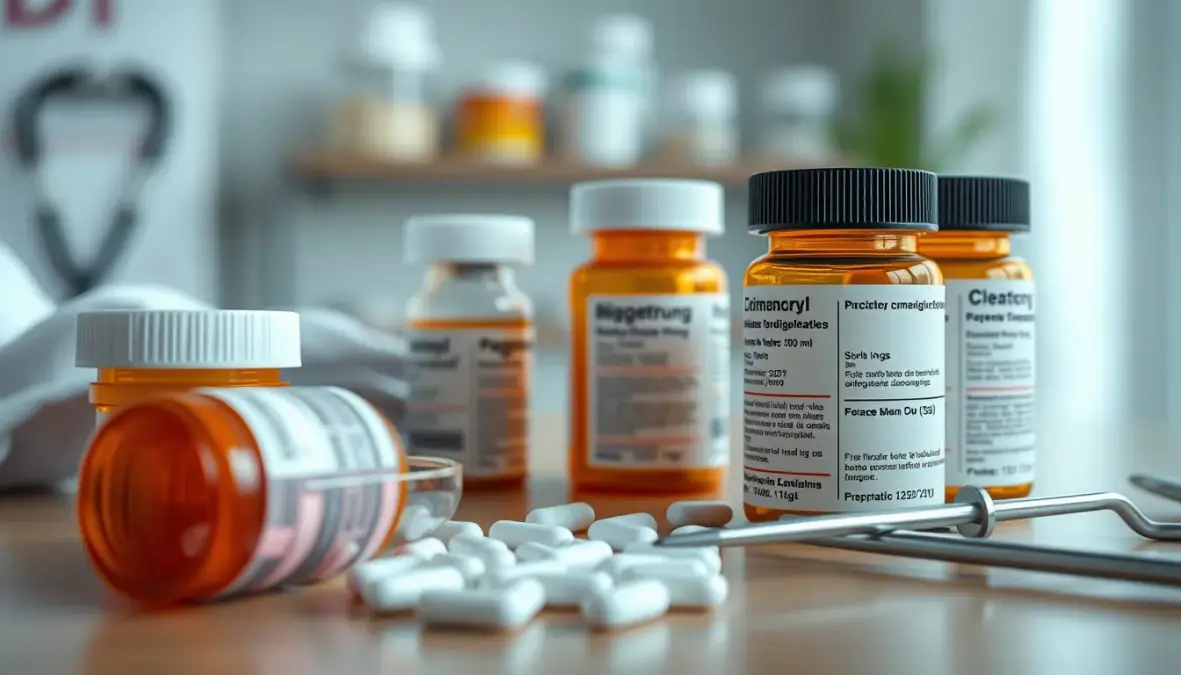In an era where overweight and obesity have become one of the main health challenges in the Western world, the weight loss drug market offers a wide range of solutions. But how do you choose the weight loss drug that is right for you? Comparing weight loss drugs can be confusing, especially when it comes to innovative drugs like Ozempic, Monjero, Saxenda and others. At Pharma Care, our goal is to provide you with comprehensive and reliable information that will help you make an informed decision together with your doctor.
This article offers a comprehensive comparison guide that will help you understand the differences between the various weight loss drugs, their mechanisms of action, their advantages and disadvantages, and most importantly - how to choose a drug that will exactly suit your medical condition, your personal needs, and the weight loss goals you have set for yourself.
What are modern weight loss drugs and how do they work?
Weight loss medications have undergone a significant revolution in recent years. While in the past most medications focused on suppressing appetite by affecting the central nervous system, modern medications work through more sophisticated hormonal mechanisms.
GLP-1 receptor agonists: the revolution in obesity treatment
The leading group today is GLP-1 receptor agonists (Glucagon-Like Peptide-1). These drugs mimic a natural hormone secreted in the gut and affect the feeling of fullness, the rate of gastric emptying, and blood sugar levels. The main drugs in this group include:
- Ozempic – Contains the active ingredient Semaglutide in a weekly dose
- Wegovy – It also contains semaglutide, but in higher doses specifically designed for weight loss.
- Saxenda – Contains Liraglutide for daily injection
- Mounjaro – Contains Tirzepatide, a dual agonist for GLP-1 and GIP
Other weight loss medications
In addition to GLP-1 agonists, there are other medications:
- Contrave – A combination of naltrexone and bupropion that affects the reward centers in the brain
- Orlistat (Orlistat/Xenical) – Blocks fat absorption in the intestine
- Phentermine – Appetite suppressant (short-term use only)
Comparison of weight loss drugs: Comprehensive comparison table
| Name of the medicine | Active ingredient and frequency of taking | Average weight loss | Key benefits |
|---|---|---|---|
| Mounjaro | Tirazeptide – weekly injection | 15-22% from body weight | Extremely high efficiency, significant improvement in diabetes |
| Wegovy | Semaglutide – weekly injection | 12-15% from body weight | Many studies, cardiovascular risk reduction |
| Ozempic | Semaglutide – weekly injection | 10-14% from body weight | Approved for diabetes, improving metabolic parameters |
| Saxenda | Liraglutide – daily injection | 8-10% from body weight | Long experience, approved for weight loss since the age of 12 |
Ozempic vs Mongero: What are the significant differences?
A direct comparison between the two leading drugs on the market reveals important differences that are worth knowing:
Mechanism of action
Ozampic Acts as a single agonist for the GLP-1 receptor, whileMongero It is a dual agonist that also affects GIP (Glucose-dependent Insulinotropic Polypeptide) receptors. Mongero's dual mechanism of action provides an advantage in weight loss and blood sugar control.
Effectiveness in weight loss
Clinical studies have shown that Monjero leads to greater average weight loss – up to 221% of initial body weight at high doses, compared to approximately 151% with Ozempic/Vigo. However, individual response varies from person to person.
Side effects
Both drugs may cause similar side effects, mainly in the digestive system:
- Nausea and vomiting (more common at the beginning of treatment)
- Diarrhea or constipation
- Stomach pain
- Decreased appetite
In Mongero, digestive side effects may be slightly more common due to the dual mechanism of action, but most patients adapt after a few weeks.
How to choose a medicine: 5 steps to making the right decision
Choosing an appropriate weight loss medication should be based on precise medical and personal considerations. Here is a recommended process:
- Comprehensive medical evaluation – BMI test, blood tests, assessment of existing medical conditions such as diabetes, high blood pressure, heart disease or kidney problems.
- Setting personal goals – How much weight do you want to lose? What is your desired schedule? Are there any other health goals, such as improving blood sugar levels?
- Practical considerations – Do you prefer weekly or daily injections? What is the price and availability of the drug? Does medical insurance cover the cost?
- Consultation with a specialist doctor – An endocrinologist or experienced family doctor can recommend the most appropriate medication depending on your condition.
- Surveillance and monitoring planning – Setting a schedule for follow-up tests, dosage adjustments, and evaluation of results.
Important considerations when choosing a weight loss drug
Pre-existing medical condition
If you have type 2 diabetes, medications like Ozempic or Monjero offer a dual benefit—weight loss and improved glycemic control. If you have a history of heart disease, Vigo has been shown to reduce cardiovascular risk.
Cost and availability
Modern weight loss medications can be expensive, and insurance coverage varies. It's important to check:
- Does the health insurance or private insurance cover the medication?
- What is a monthly deductible?
- Are there any manufacturer assistance programs?
- Availability of the drug in Israel (sometimes there is a shortage)
Lifestyle and commitment to treatment
Weight loss drugs are not a "magic bullet." Long-term success requires:
- Dietary changes – a balanced and healthy diet
- Regular physical activity
- Persistence in taking the medication as directed
- Ongoing medical monitoring
Risks and side effects that are important to know
Despite the high effectiveness, it is important to be aware of the possible risks:
Common side effects
- Digestive disorders – nausea, vomiting, diarrhea (occurring in 20-40% of patients)
- Headaches and dizziness
- Fatigue
- Losing weight too quickly can cause gallstones
Rare but serious risks
- Inflammation of the pancreas (pancreatitis)
- Kidney problems or worsening of existing kidney failure
- Diabetic retinopathy (in diabetic patients)
- Theoretical risk of thyroid tumors (based on animal studies)
Important to know: Treatment should be discontinued and a doctor should be consulted immediately in the event of severe abdominal pain, persistent vomiting, changes in vision, or signs of an allergic reaction.
When should you consider weight loss medication?
Weight loss medications are usually recommended when:
- Body mass index (BMI) is 30 or higher
- BMI of 27 or higher in the presence of comorbidities (diabetes, hypertension, dyslipidemia)
- Previous attempts to lose weight through diet and exercise have been unsuccessful
- Being overweight poses a significant health risk
Practical tips for success in treatment
To maximize your chances of success with weight loss medications, it is recommended to:
- Start with a low dose. – Gradual dose increases reduce side effects
- Keep a food diary – Recording what you eat helps identify patterns and improve habits
- Drink enough water. – At least 8-10 glasses a day
- Eat small, frequent meals. – It reduces nausea and helps maintain energy levels
- Make sure to get protein. – Adequate protein intake maintains muscle mass during weight loss
- Be patient. – Significant results take time, usually 3-6 months
Frequently Asked Questions
How long does it take to see results with weight loss drugs?
Most people start to see weight loss within the first month, but the most significant results appear after 3-6 months of treatment. It is important to understand that weight loss is a gradual process – a healthy loss is about 0.5-1 kg per week. How to choose a weight loss drug also depends on your time expectations and patience to wait for results.
Can I stop taking the medication after I reach my target weight?
This is a complex consideration. Studies show that most people regain weight after stopping treatment, although not necessarily all of the weight they lost. Some doctors recommend continuing treatment at a lower maintenance dose. The decision should be made together with your doctor based on your individual situation, ability to maintain lifestyle changes, and health risks.
Which is better – Ozempic or Mongero?
A comparison of these weight loss medications shows that Monjero generally leads to greater weight loss (up to 22% vs. 15%), but it is also more expensive and may cause more digestive side effects. Ozempic vs Monjero – The choice depends on your medical condition, budget, tolerance for side effects, and weight loss goals. Diabetics who are significantly overweight may benefit more from Monjero, while people who are moderately overweight may be fine with Ozempic.
Are weight loss drugs safe for long-term use?
Medications such as Ozempic, Monjero, and Saxenda have been studied in long-term studies over several years and have been shown to be relatively safe for long-term use. However, these are relatively new medications, and long-term safety data (over 10 years) is still being collected. It is important to have regular medical follow-up, including periodic blood tests, to ensure that the treatment remains safe and effective for you.
Can different weight loss medications be combined?
It is generally not recommended to combine drugs from the same family (for example, two GLP-1 agonists). However, sometimes doctors combine drugs from different families – for example, a GLP-1 agonist with orlistat. Any such combination must be done only under close medical supervision, as it increases the risk of side effects and requires closer monitoring. How to choose a drug or drug combination is always a decision that should be made together with a specialist.
What happens if I miss a dose?
If you miss a dose of a weekly medication (such as Ozempic or Monjero) and it has been less than 5 days since your scheduled time, take the dose as soon as you remember. If it has been more than 5 days, skip the missed dose and continue with the next dose at the regular time. Do not take a double dose to make up for it. With daily medications like Saxenda, if you miss a dose, skip it and continue with the next dose the next day.
Summary: The path to the right choice
Choosing a weight loss medication is a significant decision that should be based on comprehensive information, in-depth medical consultation, and an understanding of your individual needs. Modern weight loss medications, especially GLP-1 agonists such as Ozempic, Monjero, and Saxenda, offer a powerful tool for those struggling with overweight and obesity.
Remember that these medications are part of a comprehensive approach that also includes dietary changes, increased physical activity, and long-term habit changes. This information can help you start the conversation with your doctor, but it is no substitute for a personal and professional medical evaluation.
At Pharma Care, we are committed to providing you with up-to-date, accurate, and accessible information to help you make informed health decisions. How do you choose the right medication? With knowledge, medical support, and perseverance – you can reach your health goals.
Medical Disclaimer: The information in this article is for general informational purposes only and is not a substitute for professional medical advice, diagnosis, or treatment. Always consult a qualified physician or healthcare professional before starting, changing, or discontinuing any medication. Do not disregard or delay seeking professional medical advice because of something you have read in this article. Each medical condition is unique, and treatment should be individualized by a healthcare professional.
"`

פרופ’ אלון גרין הוא מומחה לפסיכיאטריה קלינית ומחקר תרופתי, עם התמחות בפיתוח והתאמת תרופות מרשם למגוון מצבים נוירו-פסיכיאטריים. בעל ניסיון של למעלה מ־35 שנה בעבודה קלינית ואקדמית, וכיהן כמרצה ופרופסור אורח במספר אוניברסיטאות מובילות בארץ ובחו”ל. עמד בראש יחידות מחקר וטיפול בבתי חולים ציבוריים ומרכזים רפואיים מתקדמים. תחומי עיסוקו כוללים קשב וריכוז (ADHD), הפרעות חרדה והרגעה, דיכאון קליני והפרעות מצב רוח, וכן טיפולים תרופתיים תומכי דיאטה ואיזון מטבולי. משלב גישות מבוססות ראיות עם חדשנות פרמקולוגית, ופרסם עשרות מאמרים מקצועיים בכתבי עת מדעיים, תוך תרומה משמעותית להבנת מנגנוני פעולה של תרופות והשפעתן הקלינית.







